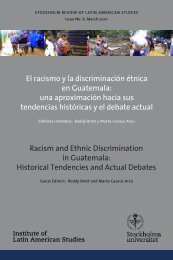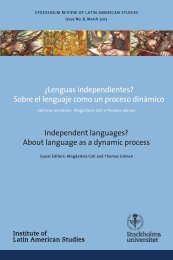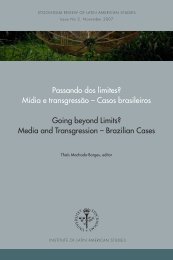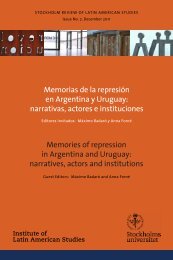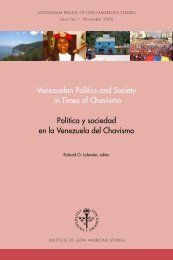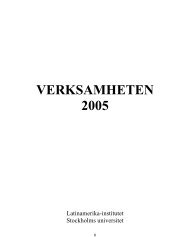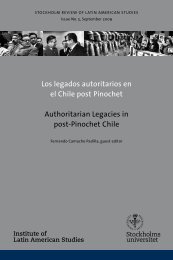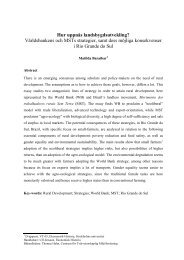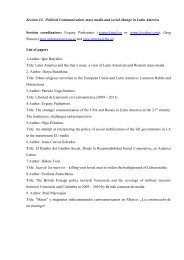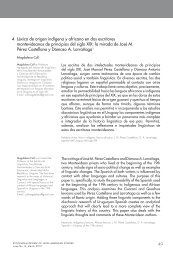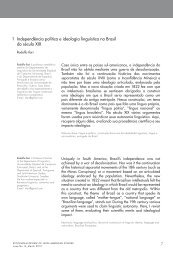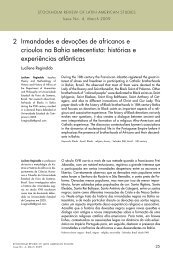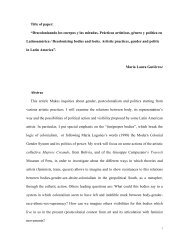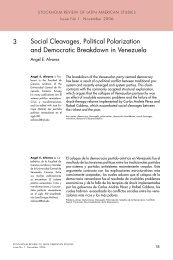Papers - Conference 2009 - Institute of Latin American Studies
Papers - Conference 2009 - Institute of Latin American Studies
Papers - Conference 2009 - Institute of Latin American Studies
You also want an ePaper? Increase the reach of your titles
YUMPU automatically turns print PDFs into web optimized ePapers that Google loves.
structural adjustment programs and the consumption driven free trade regime put forward bythe WTO, La Via Campesina and its allies propose a model <strong>of</strong>“[…] peoples‟ food sovereignty based on the rights <strong>of</strong> women and men farmers, rural workers and fisherfolk to produce food for their own local and national markets, with access to and control over their ownterritories including land and natural resources, and on peasant based agroecological farming and artisanalfishing practices for a sustainable, people based food and farming system. Food sovereignty assures theright <strong>of</strong> every person to affordable, safe, healthy, culturally appropriate, nutritious and locally producedfood, and to a life with dignity” (IPC 2006: 7).Thus, advocates <strong>of</strong> food sovereignty put social, ecological and cultural values <strong>of</strong> food beforeits material value (McMichael 2008: 218), and by doing so they change the focus <strong>of</strong> theagrarian question “[…] from production to social reproduction” (Ibid.215).Brought to public debate in 1996‟s World Food Summit 12 , food sovereignty turned into amajor topic within an international agricultural debate and was supported by various civilsociety actors as well as within United Nations bodies (IPC 2006: 5). This process can bedefined as “externalization”. Externalization has been a strategy used by members <strong>of</strong> La ViaCampesina (and others) when campaigns on a national level have not given the results theiradvocates had hoped for. Hopes are that externalized local campaigns will come back to theirnational governments with greater power (Borras Jr. 2008: 263f). 13 Some scholars speak insimilar terms <strong>of</strong> a “boomerang pattern” (see Corntassel 2007: 145; Edelman 2008). The use <strong>of</strong>“tools”, such as Declarations <strong>of</strong> Human Rights, available in the global sphere, can in otherwords be understood as strategies for local movements to empower themselves within theirown territorial contexts.Although externalization may be a useful strategy to take by social movements and othersstriving for empowerment, Marc Edelman argues that not all issue areas are equallyvulnerable to this strategy (2008: 250f). Trade and financial policies, for example, since theyare more central to G8 governments, Edelman argues, are less vulnerable to the boomerangpattern then are Human Rights (Ibid.251). Yet, if Human Rights are to be implemented or not12 World Food Summit was in 1996 held in Rom, Italy to discuss how to eliminate global hunger andmalnutrition. The meeting brought together about 10 000 participants from 185 countries and the EU. (FAO1996)13 La Via Campesina and its allies demand an effective implementation <strong>of</strong> Article 25 <strong>of</strong> the UniversalDeclaration <strong>of</strong> Human Rights, Articles 1, 2 and 11 <strong>of</strong> the International Covenant on Economic, Social andCultural Human Rights, Articles 55 and 56 <strong>of</strong> the U.N. Charter as well as governments‟ approval, ratificationand implementation <strong>of</strong> the ILO Convention 169 (IPC 2006: 7f)8



